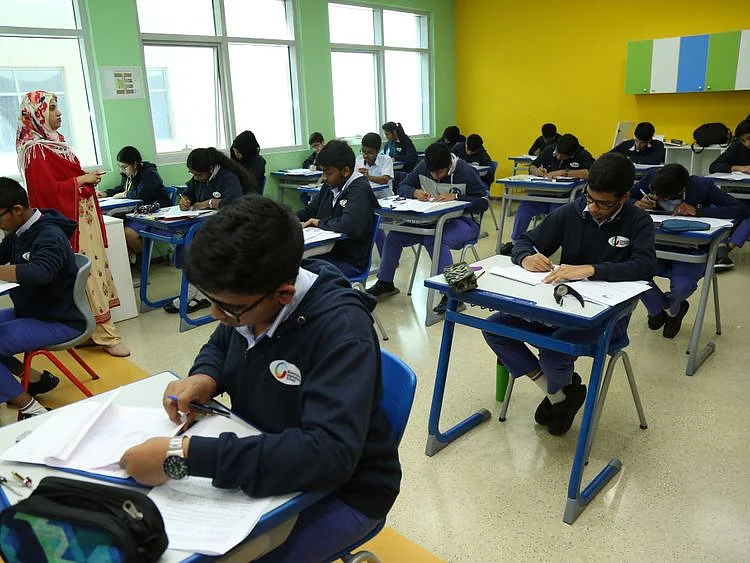Abu Dhabi: The UAE is set to welcome students for the 2025-2026 academic year on Monday, with schools across the country fully equipped and ready to host more than one million pupils.
In a major move aimed at reducing stress and modernising assessment methods, the Ministry of Education on Tuesday announced the cancellation of second-term exams, shifting toward continuous evaluation that reflects students’ performance throughout the year.
"Centralised tests at the end of the second semester have been removed and replaced with school-based summative assessments," it was announced.
Centralised tests will now remain only in the first and third semesters. The new system optimises school days, diversifies student performance assessment tools, enhances learning quality and teaching methods, promotes student wellbeing and adjusts semester weights in line with the updated policy.
The decision is part of broader reforms designed to enhance critical thinking and analytical skills while moving away from traditional high-pressure testing.
Mohammed Al Qasim, Undersecretary of the Ministry of Education, told Gulf News the new policy applies to students from grade five to 12.
“The reason for this change is to provide more academic support and focus on students' talents and extracurricular activities,” he said.
Minister of Education Sarah Al Amiri, speaking at a press briefing, confirmed that the ministry has strengthened the educational infrastructure and opened nine new schools across the country to accommodate population growth and provide a modern, innovative learning environment.
Al Amiri emphasised that the ministry has also introduced new evaluation mechanisms for all grade levels, promoting a holistic and ongoing assessment approach that better captures students’ true capabilities.
The minister told Gulf News that the public and private schools will receive more than a million students from Monday.
“In the public schools, we have focused on building the skills of the students. We are focusing on Emirati values and the Arabic language for students in kindergarten and the students from grade one to fourth grade. We are also focusing on an entire programme of coming back to school. The programme focuses on the students’ talents, how to develop them, and how to ensure that through their talents they can reach their full potential,” she said.
The back to school campaign is being held under the theme ‘From Skill to Excellence.'
AI in schools
In addition, Assistant Undersecretary for Curriculum and Assessment Amna Al Saleh announced that 1,000 teachers will be instructing students in Artificial Intelligence during the coming academic year, reflecting the UAE’s commitment to preparing the next generation for the demands of the future.
Undersecretary Al Qasim explained: “Our AI curriculum is unique compared to the other AI curriculums that were announced in other countries. It covers KG to Grade 12 and places a strong emphasis on the ethics and ethical use of AI in education.”
Emphasising that technology will serve as a supportive tool rather than a replacement, he pointed out: “It is not a replacement for our teachers. Our teachers are always the priority. They will always remain there. This is a tool to support and complement what the teachers can do and what the students can do in their projects.”
These steps align with the UAE’s vision for a forward-looking education system, ensuring schools meet international standards and equip students with the skills needed to thrive in a rapidly evolving world.
25,000 new students
The ministry oversees a total of 520 schools serving around 280,000 students.
“We have around 25,000 new registrations,” said Al Qasim.
The ministry will welcome more than 800 new teachers.
Over 5,500 school buses have been deployed, around 47,000 laptops have been distributed and more than 10 million text books have been printed for the new academic year.
Boosting skills, talents
A programme to enhance the health and nutrition of the students was also announced. Al Qasim said the programme goes beyond general health education and will incorporate professional sports players to lead activities focused on physical fitness and nutrition.
The first phase of the new Physical Education, Sports and Health Programme promotes a healthy, sustainable lifestyle by improving school health environments, organising sports tournaments, restructuring PE classes and introducing healthy meals.
"The idea is to raise professional players from among our students," said Al Qasim.
From Skill to Leadership
The Ministry also unveiled a new programme focused on nurturing student talent by encouraging community and parental engagement.
“It’s very important that we focus on talents and on inspiring students by having role models,” Al Qasim explained.
“We will get parents engaged, talking to students in their schools and classrooms about their jobs, their careers, and their culture. We’ll also bring in role models, officials, and even football players or scientists from the community to engage with the students," he added.
Under the ‘From Skill to Leadership’ educational campaign, two programmes will launch in the first month: ‘My Inspiring Family’ involving parents, and ‘Inspiring People in the Field’, both designed to motivate students on their educational journey.
Sign up for the Daily Briefing
Get the latest news and updates straight to your inbox
Network Links
GN StoreDownload our app
© Al Nisr Publishing LLC 2026. All rights reserved.

